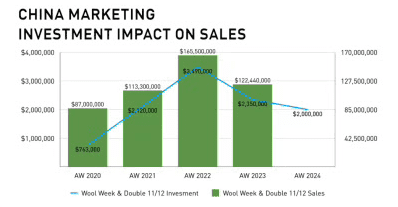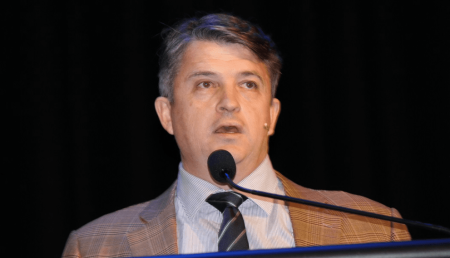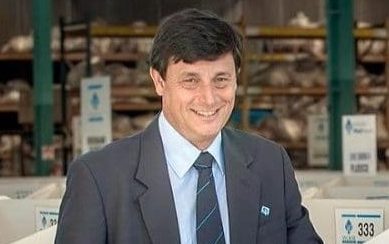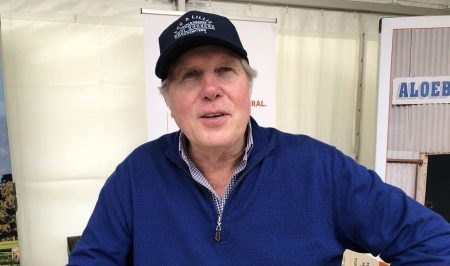MAJOR Australian wool brokers and exporters are urging growers support AWI marketing campaigns by maintaining or increasing the levy in the 2024 WoolPoll ballot.
At Wool Week in Melbourne last week, after hearing presentations from AWI/Woolmark general manager marketing and communication Laura Armstrong and Australian Wool Innovation chief executive officer John Roberts, major brokers and exporters supported maintaining or increasing the levy paid to AWI.
Ms Armstrong showed the Wool Week audience a graph that showed a clear correlation between year-on-year Woolmark investment in brand and media tactics (the blue line) and cumulative partner wool sales (the green bar) in China.
From 2020-2023 Woolmark achieved a marked year on year increase in sales, with annual sales retracting from $165.5Million to $122.4Million when campaigns budgets cut by 33 percent in 2023, she told Sheep Central.
Ms Armstrong said each year, Woolmark invests in a sales driving campaign to align with China’s Autumn/Winter selling season. The campaign includes direct investment with retail giant Tmall and several wool-rich brands to leverage China’s unique shopping festival culture. The campaign includes two key elements: A ‘Wool Week’ shopping festival, on China’s largest e-commerce platform TMALL in September and a series of investments with brand and retail partners to coincide with Double 11 (11 November) and Double 12 (12 December) shopping festivals.
She said the campaigns include engagement of key opinion leaders who use their influential platforms to educate consumers on the benefits of wool and provide a direct path to purchase wool garments throughout the shopping festivals.
A 2pc levy is needed – Lamb

Exporter Josh Lamb.
Exporter Josh Lamb said he favoured a 2 percent levy level for the next three years because of the need for AWI to continue its work on Product Environmental Footprinting (PEF) project and the European legislation against natural fibres.
AWI has been working to ensure that European Union policy makers rate wool’s environmental credentials appropriately in its PEF methodology, to prevent the introduction of a poor environmental score for wool on clothing labels.
“I think the bigger challenges regardless of the price of wool are keeping our fibre in a position where it can still access traditional markets, that’s what’s important at the moment,” Mr Lamb said.
“I think promotional campaigns will generate sales when economic conditions are better, but the bigger work they are doing is making sure wool is still a fibre of relevance.
“And that’s where growers have got to making informed decisions when it comes to the (WoolPoll) vote.”
Mr Lamb said the whole supply chain is contributing to keep wool in front of consumers.
“All we can ask is for growers to make an informed decision when it comes to the vote.
“Too often in the past that wool grower vote has been a protest vote and not an informed vote, but we can’t afford as an industry for that to happen this time around,” he said.
“Who is it going to benefit if they vote ‘zero’?”
Mr Lamb said the current wool prices are a direct result of global economic conditions.
“It’s still a fibre of choice, it’s still a fibre that brands want to use, it’s still a fibre that consumers want to buy, but the economic conditions around spending that money aren’t there at the moment and it doesn’t matter whether you are talking Europe or China.”
Mr Lamb said his business is optimistic going deeper into the current season.
“And just talking to clients in Europe they are very optimistic for latter in the year, but there are a lot of unknowns.
“The election in the US could change relations with China again.”
The calm before the storm – Colley

AWN managing director John Colley.
AWN managing director John Colley said he believed there would be a shortfall in funding to AWI because of the way the market has gone, but would not state a preference for levy level.
“If you look at the statistical evidence of what AWI has done in China, the Australia growers would benefit from that if there was more income put into the advertising of wool in all products into China.
“We are in a situation where the retail demand is not strong enough to pull through what we’ve got in the pipeline,” he said.
“We need to move stock out of the pipeline and we get to a true supply and demand situation then we’ll probably see the market rise.
“There is zero (nothing) in this economy that AWI can do to improve that – it’s not their fault.”
Mr Colley said AWI’s promotion and marketing efforts have kept wool well-placed to take advantage of a global economic recovery.
“Yes, it’s the calm before the storm …
“We are losing sheep out of Australia, we are losing the resilience of the Australian wool grower and out of it comes a reshaped industry at the grower, broker and processor levels overseas,” he said.
“Out of that comes a reshaped industry where probably everybody can make more money.”
Mr Colley said it’s a time to support the wool industry.
“There are a lot of good people at AWI, they do a lot of good work behind the scenes.
“I think it’s a time where you’ve got to support the industry and I think that it’s up to everybody who plays in the industry and takes money out of the industry that does the same thing.”
Industry is at a turning point – Moses

Broker Marty Moses.
New South Wales broker and grower, Marty Moses said the industry is at a turning point.
“We could shrink, everyone is budgeting for 7-10 percent less in wool production this time next year and that’s if the price recovers.
People are still making those decisions based on an increase in price but I’m not convinced there are enough economies heading in the right direction around the world.
“I think we are at that point where, if you would have asked me 12 months ago I would have said keep the status quo at 1.5 percent, as a wool grower I need that money in my pocket to survive rather than putting a bet on what might happen.
But I tend to agree if there was ever a time to make sure that our promotion dollar was going to take us forward, from what we were told today wool is in a great place, it’s a natural fibre
The world is moving toward natural fibres when they have the money to spend, so against what I would said a while back I’m at 1.5 possibly 2pc … and I only say that as a wool grower, I take my broker hat off, I think that we are at a big risk to shrink really rapidly .
“The industry is at an all-time turning point.”
With the run of difficult seasonal conditions, he said wool producers, and especially older growers, are running out of resilience.
Mr Moses said the Federal Government’s decision to ban live sheep exports gives him little hope “that there won’t be worse decisions coming.”
He believes the Labor Government’s decision to ban an industry that was needed to gain city votes was “criminal” and would degrade animal welfare in the trade.
Don’t forget wool in blends – Lillie

Jonathan Lillie.
Fox & Lillie managing director Jonathan Lillie said he liked AWI’s “Wear wool not fossil fuel’ ad, although he supported blending and believed wool/polyester is a good product.
“Personally I think wool should blend with anything it can.”
Mr Lillie said he supported a levy rate of 1-1.5 percent with a continued marketing spend, although he said no other country marketed wool generically and the merits of this needed to be discussed.
“At the moment we are just marketing wool generically and there would be a lot of people with sheep who ride on the back of Australia’s work.”
He said if AWI marketed Australian Merino wool specifically it might get more support from growers.
“It’s a discussion that is worthy of having again.
“If we have a continually diminishing support for the levy and then the elephant in the room for some growers is that we are generically marketing wool for everyone else as well as us, if that is possibly causing a drop off in interest, it may be a way to revive interest in keeping the levy.”
Industry has to keep pushing — Roberts

AWI CEO John Roberts.
At the Wool Week forum, Mr Roberts said AWI’s revenue is linked to the wool price, volume and yield so the company was “feeling a similar amount of pain” as the rest of the industry.
But he said although the industry was in for a hard time in the short-term, there some things to be positive about.
“I think long-term the people that stick with this fibre are going to be rewarded … I’m totally convinced of that in terms of consumer priorities and where they are heading.”
Mr Roberts said pre-COVID when the indicator was at 1800 c/kg he felt demand had outstripped supply and “I didn’t see any reason that would come crashing down.”
“I still maintain those fundamentals are the same.”
Mr Roberts said regardless of the WoolPoll result, shearer training will remain a priority of the AWI board.
AWI wants to maintain its “foot on the pedal as best we can” in terms of dealing with EU legislation and its impact around the world, he said.
“We think defending our fibre, defending wool growers’ rights to grow wool and our right to promote wool should be a priority, and if we don’t do it no one else will.
“I think there are some wins there, PEF won’t be mandated, the eco-belief system in France is being reasonable and we are getting some wins there in ensuring that wool is not collateral damage while they do their best to try and stop fast fashion competing with the French fashion houses,” he said.
“So there is a lot going on there but we’ve got to keep pushing.”
Mr Roberts said AWI’s emerging market strategy and WoolProducers work in Bangladesh and Vietnam is very important.
“So we fully support that as well …. Supporting those emerging markets is a big priority for us.
“We are also looking at Latin America now and the initial findings there have been quite interesting.”
On WoolPoll, Mr Roberts said he had explained to the exporters and brokers that AWI is in a situation where AWI’s reserves have been run down “as we said we would do when the levy went to 1.5pc.”
“We are now in the situation where there are no further reserves to draw down upon, apart from or innovation fund which sits in the vicinity of about $17 million.
That’s always been the buffer that the board have wanted to maintain should an opportunity come or a threat present itself to the business, and they’ve been hard and fast on maintain that.”
Mr Roberts said there is a further $50 million also sitting in reserves as a contingency.
“If wool growers vote ‘zero’, which is an option they get every three years and we have to fold the company up, we have to have those reserves available in order to cover all our liabilities, costs and payouts.
“I think when you hear about the reserves at AWI, they’re not $75 million, they are significantly less than that.”
He said more information about AWI reserves would be in the WoolPoll voter information kit.
“The only think I would say when it comes to WoolPoll, I’m not here to tell wool growers how to vote, but I just do urge people, if you are talking to wool growers, please encourage them to make an informed decision, that’s all I can ask and make sure they understand the headwinds the industry is facing and the opportunities that exist before they go an make decisions about levy.
Mr Roberts said after recent overseas meetings with brands, and their ESG or sustainability manager, he tried to stress the hardships the Australian wool grower are going through.
“Does that mean they are going to buy more wool, probably not, but I just wanted to make them aware that this is the reality of what is happening and if they want this fibre to be around in five, ten, 15, 20 years’ time, they need to get behind it and support it.”

Are the brokers and exporters going to contribute 2 percent of their income?
I’ll vote 1.5 percent.
If you want more…… just double the wool price.
Penny Wong could do this over lunch if she wanted to. Who is the international trade minister? Let’s face it, Labor hates farmers and there will be no pay rise.